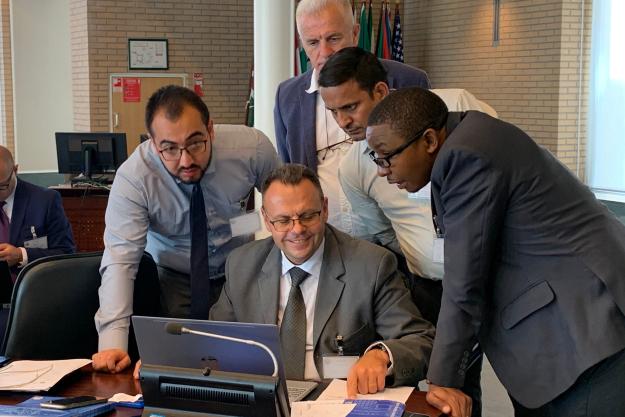
Participants during a training course on Article VI Obligations
THE HAGUE, Netherlands — 16 September 2019 — Representatives from National Authorities and chemical industry enhanced their knowledge and skills in preparing declarations and receiving OPCW inspections, during a training course on Article VI Obligations held at the Organisation for the Prohibition of Chemical Weapons (OPCW) Headquarters, from 2—6 September.
The training introduced 37 participants, representing 35 States Parties to the Chemical Weapons Convention (CWC), to the new Electronic Declaration Information System (EDIS) — to be launched later in the year — and further advanced their understanding of the Article VI verification provisions.
In her opening remarks, the OPCW Deputy Director-General, H.E. Ambassador Odette Melono, highlighted the importance of this training, stating that it has “a direct and immediate bearing on how each State Party discharges its responsibility of ensuring that chemicals are used solely for peaceful purposes”.
Practical elements of the programme included exercises on the EDIS, a demonstration of the Secure Information Exchange (SIX) platform’s encryption and decryption process, and a mock OPCW inspection — coordinated by the Dutch National Authority and hosted by Croda in Gouda.
The Dutch National Authority also shared experiences and practices in collaborating with industry and fulfilling Article VI requirements.
Participants drafted post-training action plans detailing how they will use their new knowledge and experience to improve the implementation of the Convention in their home countries.
Representatives of the following OPCW Member States participated in the event: Algeria, Argentina, Australia, Azerbaijan, Bangladesh, Brazil, Burundi, Chile, Croatia, Cyprus, Estonia, Gambia, Georgia, Guatemala, Hungary, India, Iran, Italy, Kenya, Latvia, Malawi, Malaysia, Maldives, Myanmar, Pakistan, State of Palestine, Philippines, Republic of Northern Macedonia, Saudi Arabia, Slovakia, South Africa, Spain, Sudan, Sweden, and Togo.

Background
As of August 2019, 92 OPCW Member States have submitted declarations for declarable facilities or activities for 2018, involving over 5,300 sites.
Since its establishment, the OPCW has conducted more than 3,900 inspections of Article VI sites to verify that the production and use of chemicals are used solely for peaceful purposes.
As the implementing body for the Chemical Weapons Convention, the OPCW, with its 193 Member States, oversees the global endeavour to permanently eliminate chemical weapons. Since the Convention’s entry into force in 1997, it is the most successful disarmament treaty eliminating an entire class of weapons of mass destruction.
Over 97% of all chemical weapon stockpiles declared by possessor States have been destroyed under OPCW verification. For its extensive efforts in eliminating chemical weapons, the OPCW received the 2013 Nobel Peace Prize.

